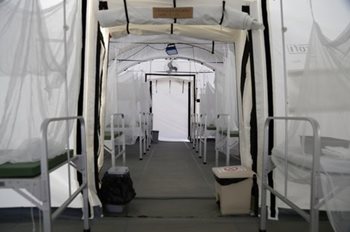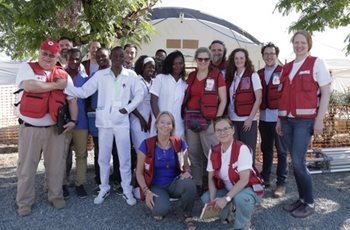By Joseph Leger, Canadian Red Cross communications aid worker

The Red Cross field hospital in Mozambique has opened a specialized malaria treatment centre to support people affected by Cyclone Idai. This is in addition to the existing cholera treatment unit that has been operating at the Nhamatanda rural hospital since early April.
According to Mozambique’s Ministry of Health, there have been more than 22,000 confirmed malaria cases in Sofala Province since Cyclone Idai, with more than 10,000 of those are in Nhamatanda district.
“The number of malaria cases are up compared to this time last year,” said Dr. Lynda Redwood-Campbell, senior medical officer with the Red Cross field hospital. “We are currently seeing that between six and nine per cent of all the emergency room visits in the Nhamatanda rural hospital are malaria, and most of them are complicated malaria.”
Cyclone Idai brought heavy rains and flooding and as the water receded, it left pools of stagnant water where malaria-carrying mosquitos breed.
The centre will help reduce the burden on the already strained Nhamatanda hospital, while providing training opportunities for the local medical staff. The 20-bed malaria ward will be run by local doctors and nurses hired by the Red Cross. The local staff will be providing the primary care to the patients, with Red Cross medical aid workers providing support and mentorship.
“The centre will help a lot because in the last few days there have been many cases of malaria in the hospital,”said Fernando Matias Agostinho, a doctor working in the newly opened centre. “We will work together with the Canadian Red Cross so that with our treatments the malaria cases will go down. This will help the staff in the hospital and our community.”
The new addition to the Red Cross field hospital will admit only the most severe cases of malaria.
“The centre consists of an L-shaped tent with a section for women and children and a section for men,” described Frode Oosterling, a doctor from the Norwegian Red Cross. “Admittance is based on those people with severe Malaria. This is anyone who arrives at the hospital and tests positive for malaria, but are too sick to be treated by oral medications at home.”

The sixteen nurses and seven doctors assigned to the centre have already held several training sessions, in collaboration with the Red Cross medical staff, to prepare them for their new roles.
“I’m so happy to be here because I’m learning so many things that I did not know about before,” said Essinate Siboi Samuel Jemusse, a nurse. “I’m also happy because there are so many cases of malaria right now and this new centre will reduce those cases.”
Dr. Lynda Redwood-Campbell explained that that while giving medical treatment is critical for treating malaria, it is only part of the solution.
“To treat malaria, you need a multi-pronged approach and it’s not just treating individual patients,” she said. “It’s about treating communities through community engagement and outreach in terms of helping them understand the transmission of malaria and to get early treatment. The Red Cross is doing lots of that work, along with several other NGOs and the Ministry of Health.”
The Mozambique Red Cross, with support from the International Red cross, is holding a series of first-aid courses for local volunteers in Nhamatanda. These three-day courses will include malaria first-aid and prevention training.
Cyclone Idai and the subsequent flooding has created the worst humanitarian crisis in Mozambique’s recent history. Thanks to the Government of Canada and the generosity of Canadians, the Canadian Red Cross is in the country operating a field hospital with the Finnish Red Cross and other Red Cross partners, working with local staff and volunteers in Nhamatanda, about 100 kilometres north of the port city of Beira.
On March 15, 2019, Cyclone Idai made landfall in Mozambique, affecting over 1.8 million people, destroying approximately 111,000 homes and half a million hectares of agricultural land. The Canadian Red Cross responded by sending a field hospital, and supporting staff, to Nhamatanda in collaboration with the Finnish Red Cross and with the support of the Norwegian Red Cross.
The field hospital is made possible with the generous support of donors and the Government of Canada.